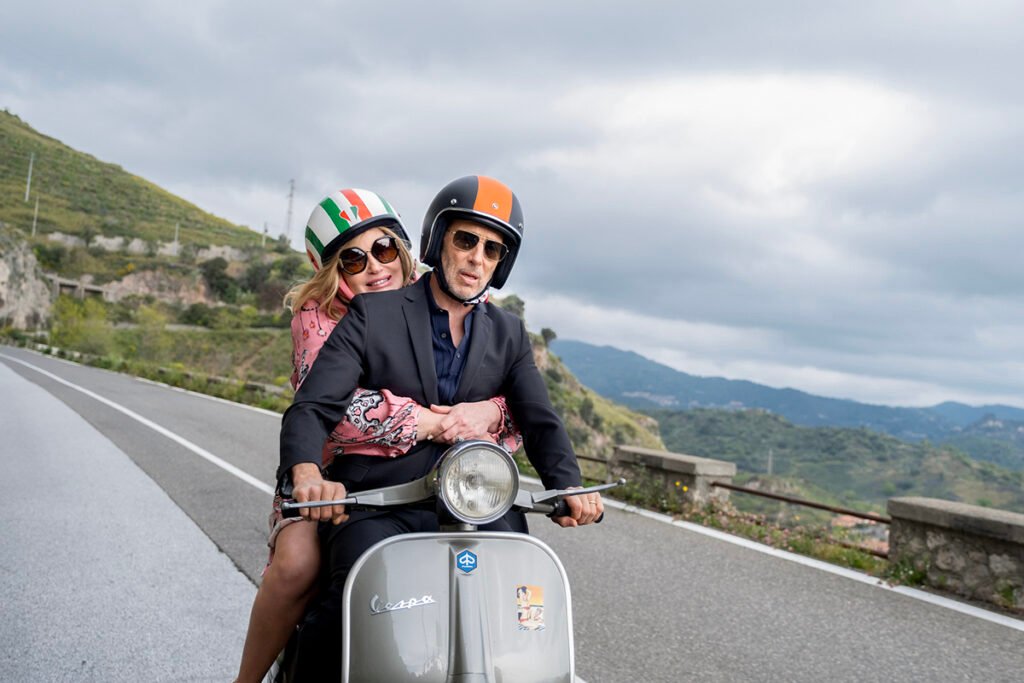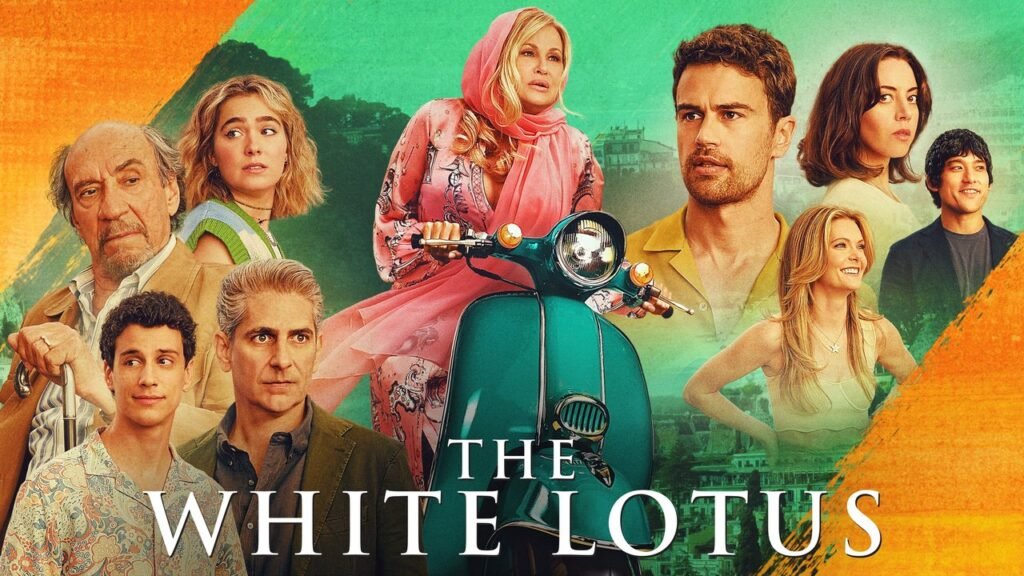Set in the luxurious White Lotus resort in Taormina, Sicily, Season 2 explores themes of sexual politics, power, betrayal, and wealth privilege. Unlike Season 1, which focused more on class and colonialism, this season is all about desire and deception—especially within romantic relationships.
Tanya McQuoid’s Tragic Arc
Tanya (Jennifer Coolidge) is the only major character returning from Season 1. She’s now married to Greg, who seems distant and cold during their vacation. Tanya is lured into a social circle led by Quentin, a wealthy, flamboyant expat who appears to be obsessed with beauty and nostalgia. Eventually, she suspects that Quentin is involved in a plot to kill her—likely orchestrated with Greg—so he can inherit her fortune thanks to their prenup.
In the penultimate episode, Tanya finds herself trapped on Quentin’s yacht. After discovering a gun, she takes matters into her own hands and shoots everyone onboard. Ironically, she dies not from the murder plot but by slipping off the boat and hitting her head while trying to escape—proving that no matter how much money or agency she gains, she’s still trapped by forces beyond her control. It’s dark, tragic, and poetic.

Portia & Jack – A Chilling Escape
Portia, Tanya’s Gen Z assistant, is caught in her own web. She becomes romantically involved with Jack, who turns out to be Quentin’s “nephew” (and potentially more than that). Slowly, Portia realizes something is wrong—her phone is gone, Jack is evasive, and they’re being kept away from the hotel.
In the finale, she confronts Jack, who confirms her suspicions but lets her go. He ominously warns her not to return to the White Lotus or ask too many questions. It’s an unsettling reminder that the rich can get away with murder—literally—because those who uncover the truth are too afraid (or powerless) to do anything.

The Di Grasso Men – A Cycle of Lust and Regret
The Di Grasso family—grandfather Bert (F. Murray Abraham), father Dominic (Michael Imperioli), and son Albie (Adam DiMarco)—represent three generations of Italian-American men, each with their own issues around women and sex.
- Bert is the old-school womanizer who romanticizes the past.
- Dominic is a sex addict trying (and failing) to change.
- Albie wants to be the “good guy,” but still falls for Lucia, a charming sex worker.
Albie believes Lucia is in danger and convinces Dominic to give him €50,000 to “rescue” her. Of course, Lucia plays him—there was no pimp, and she disappears with the money. It’s a brutal lesson in how naivety and entitlement often go hand-in-hand, even among those who see themselves as progressive.

Ethan, Harper, Cameron, and Daphne – Infidelity & Mind Games
Two couples go on vacation together, and things spiral quickly.
- Ethan and Harper are intellectuals who believe they’re above traditional gender roles—but jealousy and suspicion eat away at them.
- Cameron and Daphne are playful and seductive, but hide deep emotional wounds behind smiles and Instagram posts.
After Harper kisses Cameron (possibly more), Ethan grows paranoid and confronts him. In a twist, Ethan ends up with Daphne in a secluded area—and although it’s never shown explicitly, it’s strongly implied they hook up as well. This sparks a sexual rekindling between Ethan and Harper, suggesting that chaos and betrayal actually reignite their marriage.

Mia and Lucia – The True Winners?
Mia (an aspiring singer) and Lucia (a savvy escort) may seem like supporting characters, but they represent clever outsiders who beat the system. By the end of the season:
- Mia gets a permanent gig as the hotel lounge singer.
- Lucia walks away with €50,000, tricking the privileged but oblivious Albie.
Their triumph isn’t just luck—it’s strategy. They exploit the desires and blind spots of the wealthy tourists and end up with the kind of financial and emotional agency the others fail to achieve.

Themes and Symbolism — The White Lotus: Sicily
Season 2 of The White Lotus peels back the glamorous surface of a Sicilian luxury resort to expose the deep dysfunctions simmering underneath. Through its twisted relationships, satirical tone, and murder mystery framing, the show explores universal truths about power, gender, wealth, and illusion. Below are the core themes that shape the season’s storylines and characters.
1. Sex and Power
At the core of nearly every interaction this season lies a power struggle—often disguised as romance or seduction. The show deconstructs the way sex is used not just for pleasure or connection, but as a tool to assert dominance, manipulate, or reclaim control.
- Cameron uses flirtation and charm to unsettle Ethan and assert dominance in their bromantic rivalry.
- Lucia wields her sexuality as a form of survival and negotiation. For her, intimacy is business—and she’s always in control.
- Daphne subtly reveals that she knows about Cameron’s infidelities and uses her own sexual agency to keep the upper hand in the relationship.
- Even Ethan and Harper, who try to present themselves as the “healthy” couple, fall into sexual mind games. Their intimacy only reignites after they experience jealousy and betrayal—suggesting power struggles can paradoxically revive passion.
In The White Lotus, sex isn’t just about attraction—it’s a currency, a weapon, and a mirror of one’s insecurities and aspirations.
2. Illusions vs. Reality
The entire resort setting is like a theatrical stage—picturesque, curated, and completely artificial. Behind every luxurious suite and Instagrammable moment lies deception, discontent, or decay.
- Characters are constantly pretending: Tanya wants to believe in fairy-tale love even as her husband plots her death.
- Albie imagines himself as a savior, rescuing Lucia from danger, when he’s actually being conned.
- Daphne and Cameron perform a picture-perfect marriage while quietly accepting each other’s betrayals.
- The White Lotus brand itself is a metaphor for this facade—selling a dream while housing dysfunction.
By the end, it’s clear: everyone is lying to themselves or others in order to keep the illusion going. Reality is far messier than what’s being presented—and often far more dangerous.
3. Female Agency
Season 2 presents a wide spectrum of female characters who navigate male-dominated environments on their own terms—some through manipulation, others through quiet rebellion or brutal honesty.
- Tanya may meet a tragic end, but she still goes out fighting—literally. Her final act is one of resistance.
- Portia realizes too late the danger she’s in, but she listens to her instincts and escapes before it’s too late.
- Daphne chooses emotional self-preservation over confrontation. She knows Cameron cheats, but instead of leaving, she reclaims power by doing the same—and maintaining control of the narrative.
- Lucia and Mia are the ultimate symbols of autonomy. They start at the bottom of the resort’s power hierarchy but outsmart everyone and walk away with their futures in hand.
Even when trapped within systemic power structures, the women of The White Lotus wield more agency than their male counterparts expect—and often outmaneuver them completely.
4. The Rich Always Win (Except Tanya)
One of the show’s most biting critiques is how insulated the ultra-wealthy are from consequences.
- Cameron, Daphne, Dominic, Bert, and Albie all leave the resort largely unchanged. Their dramas, lies, and infidelities remain private luxuries they can afford.
- Lucia, while not part of the elite, wins by playing the system—beating the rich at their own game.
The only one who doesn’t survive is Tanya—and her downfall is symbolic. Despite her wealth, eccentricity, and privilege, she was too naive to see how transactional love could be. Her tragic, almost absurd death—falling while trying to climb into a dinghy after committing multiple murders—reinforces that money can’t save you from loneliness, poor judgment, or fate.
In the end, The White Lotus suggests that wealth buys freedom, but not wisdom, love, or safety. Those who survive aren’t necessarily the good or the innocent—they’re the ones who adapt best to the rules of the game, however cruel.

Character Analysis – The White Lotus: Sicily
Every character in Season 2 of The White Lotus acts as a symbol—of wealth, entitlement, repression, or rebellion. Through a tightly written ensemble, Mike White paints a satirical yet emotionally sharp portrait of tourists caught in their own psychological traps. Here’s a closer look at the key players and what they represent.
Tanya McQuoid-Hunt
Symbol of: Wealthy Delusion + Emotional Fragility
Tanya is the emotional core of both seasons—a woman drowning in privilege but desperate for love and validation. Her arc is tragicomic: she senses danger too late, lashes out violently, and dies in a freak accident that underscores her inability to escape the consequences of her own detachment from reality. Tanya is a gothic heroine trapped in a luxury nightmare, and her death feels as absurd as it is heartbreaking.
Portia
Symbol of: Disillusioned Youth + Generational Anxiety
Portia embodies modern aimlessness. She’s glued to her phone, uncertain about her values, and caught between safety and danger. Her fling with Jack is equal parts thrilling and terrifying, and her realization that she’s a pawn in something darker mirrors Tanya’s too late awakening. Unlike her boss, though, Portia gets out alive—wiser, shaken, but still uncertain of what’s next.
Cameron Sullivan
Symbol of: Alpha Male Privilege + Capitalist Arrogance
Cameron is the ultimate “bro” businessman—cocky, entitled, manipulative. He treats women, friends, and even vacations like conquests. He flirts with Harper not because he’s interested, but to assert dominance over Ethan. Despite everything, Cameron faces zero consequences, which speaks volumes about how society rewards charm over integrity when it comes in the right (rich, white, male) package.
Daphne Sullivan
Symbol of: Controlled Chaos + Quiet Power
Daphne may appear superficial at first glance, but she’s one of the smartest characters in the show. She knows what her husband is doing—and rather than fall apart, she adapts. She chooses happiness over confrontation, and instead of demanding monogamy, she crafts her own version of fulfillment. Her ambiguous encounter with Ethan is less about revenge and more about reclaiming her agency.
Ethan Spiller
Symbol of: Repressed Anger + Crumbling Morality
Ethan is supposed to be “the good guy,” but he’s filled with quiet resentment. He’s uncomfortable with Cameron’s wealth, suspicious of Harper, and ultimately gives into the same primal instincts he claims to reject. His journey is a descent—from moral superiority into suspicion, aggression, and a strangely erotic power game with his wife and Daphne. He ends up no better than the men he judges.
Harper Spiller
Symbol of: Intellectual Disillusionment + Emotional Control
Harper begins the season judgmental and performatively superior, but soon realizes she’s not immune to temptation or dysfunction. Her brief connection with Cameron (real or not) becomes a power play, both in her marriage and the group dynamic. By the end, she seems more alive—reconnecting with Ethan through emotional volatility, not logic. Her arc challenges the idea that emotional restraint is the same as relationship health.
Dominic Di Grasso
Symbol of: Guilty Privilege + Performative Regret
Dominic is a sex addict trying to “do better,” but his actions rarely align with his words. He’s constantly apologizing, but there’s little evidence he’s actually changing. His arc, juxtaposed with his son and father, highlights how performative guilt often masks entitlement. He’s trying to escape the cycle—but can he? Or is regret just another indulgence for men like him?
Albie Di Grasso
Symbol of: Woke Idealism + Male Naivety
Albie positions himself as a “nice guy” in contrast to his dad and grandfather, but he’s still part of the same patriarchal lineage. He wants to save Lucia, projecting his ideals onto her without understanding her reality. When she takes his money and vanishes, it’s a wake-up call: good intentions don’t exempt you from being used—or from being a little bit foolish.
Mia & Lucia
Symbols of: Outsider Wit + Feminine Rebellion
Mia and Lucia are the only characters who end the season better than they started. They manipulate, adapt, and scheme—but they never pretend to be anything they’re not. Mia gets her dream gig, and Lucia walks away €50,000 richer. They are the only people at the resort who don’t want to be something else. They play the game and win it—because they never forget it is a game.

Ending Message
The White Lotus Season 2 ends with one dead, several betrayed, and others pretending nothing ever happened. Just like life at the top, what’s swept under the rug stays there—until it doesn’t.



